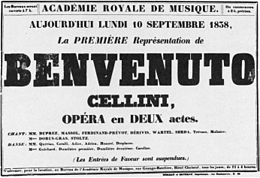Benvenuto Cellini (opera)
| Benvenuto Cellini | |
|---|---|
| opera semiseria by Hector Berlioz | |

Poster for the premiere
|
|
| Librettist | |
| Language | French |
| Based on | Benvenuto Cellini |
| Premiere | 10 September 1838 Salle Le Peletier, Paris |
Benvenuto Cellini is an opera semiseria in two acts with music by Hector Berlioz and libretto by Léon de Wailly and Henri Auguste Barbier. It was the first of Berlioz's operas, premiered at the Académie Royale de Musique (Salle Le Peletier) on 10 September 1838. The story is inspired by the memoirs of the Florentine sculptor Benvenuto Cellini, although the elements of the plot are largely fictional. The opera is technically very challenging and rarely performed. However, the overture to the opera sometimes features in symphony orchestra programs, as does the concert overture Le carnaval romain which Berlioz composed from material in the opera.
Berlioz wrote in his memoirs that in 1834 (when he was thirty years old)
I had been greatly struck by certain episodes in the life of Benvenuto Cellini. I had the misfortune to believe they would make an interesting and dramatic subject for an opera, and I asked Léon de Wailly and Auguste Barbier...to write a libretto around them
The only plot element drawn directly from Cellini's memoirs concerns the casting of his statue of Perseus (which was in fact not cast in Rome but in Florence for Duke Cosimo I de Medici, where it is stll displayed in the Loggia dei Lanzi). All the personae other than Cellini (with the exception of Pope Clement VII who in the opera is made the commissioner of the statue), and all the other episodes in the opera, are invented.
The original libretto (now lost), which seems to have been in the format of an opéra comique, was rejected by the Paris Opéra-Comique company. The story was then reworked into an opéra semiseria format, without spoken dialogue, and offered to the Paris Opéra, for which it was accepted in 1835 by the new Opéra director, Henri Duponchel. With actual composition starting in 1836, the opera was first performed at the Opéra on September 10, 1838, conducted by François Habeneck, and with Gilbert Duprez in the title role. At its premiere, the audience hissed most of the music after the first few numbers.
...
Wikipedia
